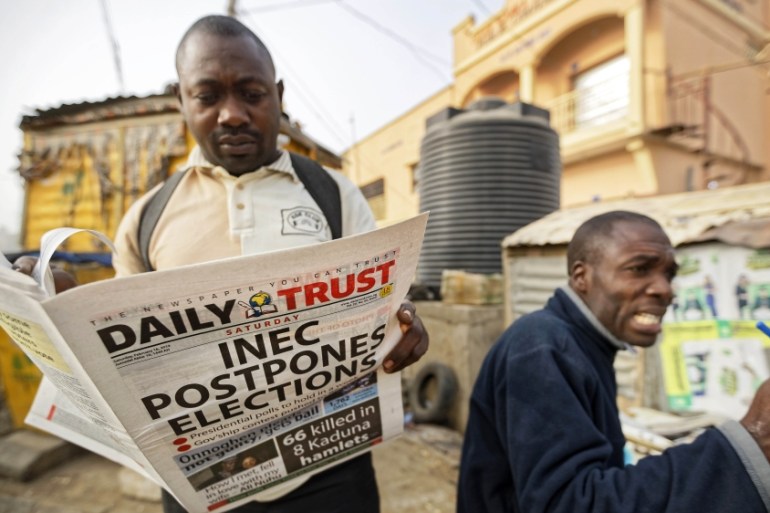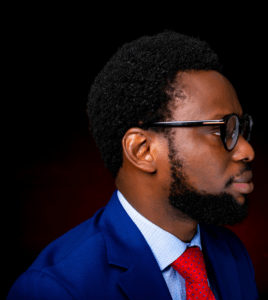It was not just bad weather and arson that delayed the Nigerian election.

Had everything gone according to plan, Nigeria by now would have had a new elected president.
But the Independent National Electoral Commission (INEC) left holes in its planning and, to make the matters worse, there were way too many contingencies out of its control.
So roughly five hours to the scheduled commencement of voting on Saturday morning, INEC Chairman Mahmood Yakubu announced that the vote would have to be postponed by a week, because of sabotage, bad weather and other logistical challenges. But the reasons for the aborted start of the election run much deeper than that.
This is the third consecutive general election to be postponed in Nigeria. In 2011, voting was already in progress when INEC halted proceedings, sensing that the inadequacy of ballot papers could derail the integrity of the vote. In 2015, the country’s highest security officials – widely believed to have been encouraged by former President Goodluck Jonathan – boxed INEC into a six-week postponement on the claim that they couldn’t guarantee protection during the vote unless they were given more time to further decimate Boko Haram. But, even if the security chiefs hadn’t forced INEC’s hands, the election would have failed spectacularly – because the INEC was not ready.
This year, Yakubu’s election game plan lacked flexibility and did not take into account all the possible factors that could disrupt proceedings. Suspected incidents of arson led to the destruction of vital electoral materials in INEC offices in three different states, while bad weather prevented the delivery by air of ballots to a number of areas.
Disruptive activities had marred previous Nigerian elections and there were already warning signs that the same would happen this year. Just prior to the scheduled date of the vote, Boko Haram fighters attacked two of the airports INEC was going to use for distribution of electoral materials. Had there been a plan for the last-minute loss of vital materials and for alternative delivery routes, the postponement wouldn’t have been necessary.
There’s no denying that the INEC left far too much in the hands of fate, but it is important to point out that the commission was also the victim of desperate political power tussles in the months leading up to the vote. Chairman of the ruling party Adams Oshiomhole, President Muhammadu Buhari himself and Senate President Bukola Saraki were all part of events that set the INEC back by many months in 2018.
First, it was the executive who, for whatever reason, didn’t include INEC’s supplementary needs into the 2018 budget. Again, after presenting the 2018 budget to the National Assembly in November 2017, the executive didn’t immediately submit a supplementary budget, waiting a further six months before finally presenting it in June 2018.
By then, the tension between the executive and the legislature was sky-high due to suspicions Senate President Saraki was about to dump Buhari’s party for the opposition. When the supplementary budget finally came in, the legislature failed to consider it. In July, Saraki announced his defection from Buhari’s All Progressives Congress (APC) to the opposition People’s Democratic Party (PDP), and ordered an abrupt and lengthy recess to prevent impeachment by majority members of Buhari’s party.
The Senate eventually approved a budget of 189 billion nairas ($522m) for the INEC in October. But by November, the Senate was still dilly-dallying over the mode of sourcing payment; that was five months lost from the date the supplementary budget was submitted and close to a year wasted in all.
Crucially, the INEC obtained its budget just four months before the presidential election – an incredibly short period of time to prepare for a vote in a political and security environment as challenging as Nigeria’s. To illustrate, the INEC smart card reader on its own took six months to make!
Incidentally, those at the heart of that atrocious politicking have been some of the most vociferous critics of the election rescheduling. In a statement issued on Saturday, for example, Buhari said he is “deeply disappointed” in INEC for postponing the election despite “the long notice given”.
Despite all these troubles, recent history shows it isn’t all doom and gloom for Nigeria yet. After the 2015 postponement, former INEC head Attahiru Jega went on to lead the conducting of a relatively fair election that saw an opposition candidate defeat an incumbent for the first time in the history of Nigeria’s democracy.
It may not have been perfect but the opposition couldn’t have won if the election wasn’t largely free of large-scale violations. Yakubu can do the same, but he will have to battle with one major challenge: potentially low turnout.
Waiting till the 59th minute of the eleventh hour before announcing the postponement has definitely curbed the enthusiasm of many Nigerians to go out and cast a ballot. Moreover, of the 14.28 million new voters who registered for this year’s election, only 76 percent picked up their voter cards as of the February 9 deadline. Many Nigerians who live far from the places where they are registered will also find it a challenge to cast their votes as the current law does not allow them to vote at any other location.
When the 2019 elections are all done and dusted, Africa‘s largest economy must have an important conversation about its electoral process.
The budgeting and funding process should be made immune to the whims of the legislature and the executive; a law making budget presentation and passage within a certain timeframe mandatory can take care of that. It’s also time for voting to go electronic so polling booths can be decongested and the logistical nightmare of processing ballots eased.
The Nigerian diaspora provides the sixth largest remittances in the world and yet it is not allowed to vote. Smaller African countries like Botswana, Malawi, Namibia and Mozambique are already ahead of the game on this and there is no reason why Nigeria should not follow suit.
But most importantly, Nigeria’s election dates need sacrosanctity. In the United States, for example, the election day is set by law to the first Tuesday after the first Monday in November. So the next US presidential vote is already scheduled for November 3, 2020, granting enough time for preparation and ensuring voter confidence in the electoral system.
It would be great if Nigeria achieves that by 2023.

